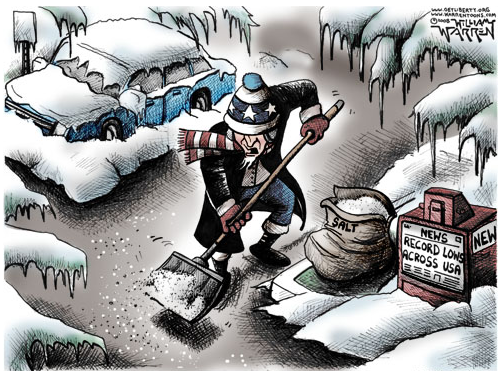0.8 percent. That is how much winter weather knocked off the Gross Domestic Product estimate by the Bureau of Economic Analysis, which came in at just 0.2 percent in the first quarter, says St. Louis-based Macroeconomic Advisers.
The firm finds a small link between the amount of snowfall in areas of high population and economic output.
“The correlation might not be very high,” the firm’s senior economist Ben Herzon told the Washington Post, “But we can still estimate pretty accurately the contribution.”
And that contribution, if you buy the analysis, means that on a snow-adjusted basis, the economy grew 1 percent in the first quarter.
Oh, wait, that’s still terrible.
But you would not know that if you were to ask the White House, which has been peddling the financial winter hysteria, or to read some headlines such as Accuweather.com’s “U.S. economy suffers in first quarter of 2015 as brutal winter curbs sales,” or the Daily Mail’s “Harsh winter causes U.S. economic growth to grind to a halt.”
The same nonsense was spouted last year.
In the first quarter of 2014, the same firm found the bad winter trimmed 1.4 percent off the Gross Domestic Product, which contracted at a 2.9 percent rate. Meaning, even without the snow, the economy still would have shrunk at a 1.5 percent rate that quarter.
So, snow or no snow, the economy is slow.
In fact, the economy has not grown above 3 percent since 2005, the longest sustained slowdown in output in U.S. economic history since the Great Depression.
That is not to say that one cannot find economic impact that coincides with colder weather. For example, if one compares snow cover in North America as measured by the Rutgers University Global Snow Lab with economic data, there appears to be a weak negative correlation with above-average snow cover in January through March coinciding with below-average growth in the first quarter, and vice versa, in 34 out of the past 49 years.
Interestingly, the first quarter of 2015 was not one of those years, however.
Yet, seemingly, based on the data, one finds that first quarters tend to perform worse than the rest of the year. Since 1967, first quarters have averaged 2.61 percent growth, while the second through the fourth quarters have averaged 2.94 percent growth. So winters slow down the economy, right?
Wrong. Such impact is non-existent prior to 2006, when the first quarter averaged 3.27 percent growth, actually outpacing the second through the fourth quarters, which averaged 3.19 percent.
From 2006-2015, first quarter growth averaged 0.03 percent, and the second through the fourth quarters 2006-2014 averaged a substandard 1.91 percent, all coinciding with the Great Recession.
In other words, the economy is in the midst of a true slowdown.
Americans for Limited Government President Rick Manning points to the longer trend at play, saying, “The common denominator here is not the weather, but the fact that the economy started to turn downward in the second half of the 2000’s and still has not recovered. We didn’t suddenly start having winters when the Great Recession occurred. Dispense with the bull market spin.”
So while there may be some limited impact on the economy caused by the snow — much of it could still just be a coincidence — the supposed magnitude seen in mainstream media outlets is almost certainly overstated.
As Manning stated, “It’s not the weather, stupid, it’s the economy.”
Robert Romano is the senior editor of Americans for Limited Government.







